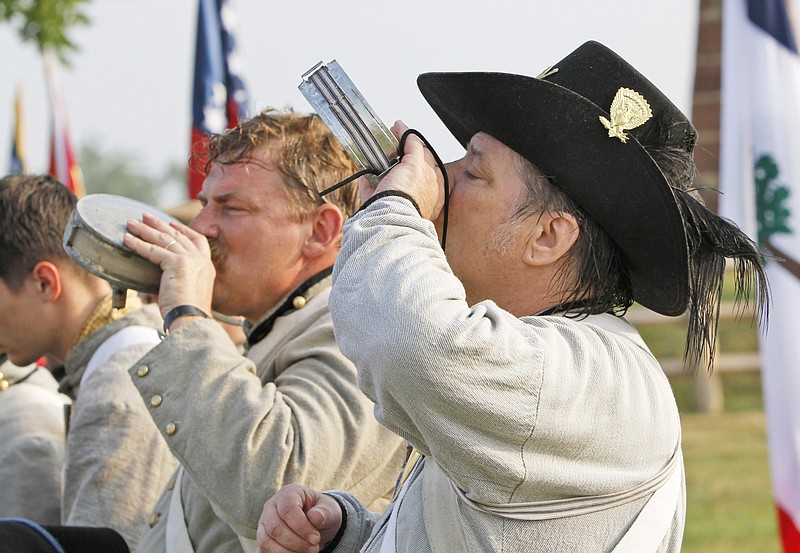By MATTHEW BARAKAT
Associated Press
MANASSAS, Va. - For all the attention to authenticity, organizers for a major re-enactment marking the 150th anniversary of the Battle of Bull Run can't replicate one important detail: the weather.
Forecasts this weekend in Manassas call for temperatures to reach triple digits, with the heat index perhaps exceeding 115 degrees. Back in 1861, when the North and South clashed in the Civil War's first major land battle, recorded temperatures were in the 80s.
But authentic wool uniforms are a point of pride and are not to be sacrificed in the name of staying cool. So what's a re-enactor to do?
"Suck it up," called out a member of the 4th Virginia Infantry, Company A, when fellow re-enactor Corey James, 20, of North Canton, Ohio, was asked about the weather.
The re-enactors differ on whether the wool uniforms worn by soldiers of the era are as oppressively hot as they appear. One re-enactor shows off his muslin undergarments, which he said are typical for the era and breathe and help stay cool. George Alcox, 58, of Berea, Ohio, pretended to agree.
"They're not as hot as they look. They're hotter," he said.
At Manassas, uniforms are especially important. More than 200 uniforms were worn in the battle, which relied heavily on militia units from the various states, each of which had its own distinctive uniform. The patchwork of colors contributed to confusion on the battlefield, as soldiers struggled to determine who was friend and who was foe.
At the time, flamboyant uniforms modeled on the French Zouave units that served in North Africa were in style, with baggy trousers and fez hats.
John Gerndt, 51, of Centreville, portrays soldiers in several different units depending on which battle is re-enacted. But the First Battle of Manassas allows him to break out his uniform for the 11th New York Infantry, 1st Fire Zouave regiment, which only saw action in Manassas. Drawn from New York firefighters, the red and blue wool uniform is one of the more distinctive on the battlefield.
"We'll see how I hold up," Gerndt said Thursday of the looming re-enactments, dripping beads of sweat already at 9 a.m. as he attended ceremonies hosted by the National Park Service.
He carries a 19th-century canteen and tries to drink plenty of water before the re-enactments begin.
"There's really nothing you can do except slow down a little bit" on the battlefield, he said. "My sacrifice, on my level is well worth me doing a little bit of sweating" to honor the soldiers who died in battle.
Don Warlick, who helped create the battle scenes in the Civil War film "Gods and Generals," is directing the re-enactments at Camp Manassas. He said the heat can pose a problem, especially for a re-enactor population that is largely middle aged even though soldiers themselves were typically young men.
"Our society has gotten more accustomed to air conditioning, not doing things the old way," Warlick said.
So he urges people to slow down and stay hydrated.
"You've got to slow down to give the animals and the men time to catch their breath," he said.
Keeping people hydrated is a daunting task considering that 8,700 people are participating in the re-enactment, many of whom set up camp for the weekend. Ann Marie Maher, executive director of Prince William County's tourism bureau, which is the battle re-enactment's main sponsor, said an elaborate pumping system has been set up to get water to the campgrounds. There, free-flowing spigots are one of the rare concessions to modern life that are allowed.
Event planners are also considering the general public's health in the excessive heat. The National Park Service, which does not sponsor battle re-enactments but is hosting a series of events, canceled some afternoon programs Friday because of the heat. Among the canceled events were walking tours on the preserved battlefield, which offers little respite from the sun.
Maher said the re-enactments Saturday and Sunday will begin at 9:30 a.m., a long-planned concession to the heat. Cooling and misting tents will be available, and shade tents have been added as the forecasts called for 100-degree days, Maher said. Prince William Hospital donated 30,000 bottles of water that will be given to spectators.
Debbie Haight, executive director of Historic Manassas, Inc., which is sponsoring Camp Manassas and a series of programs throughout the city of Manassas, said shuttle buses that will carry crowds are air conditioned. And cooling tents manned by the Red Cross will be available to spectators at the various locales.
"We kind of knew as we were planning that it's July and it's Virginia, and it's going to be hot," she said.
